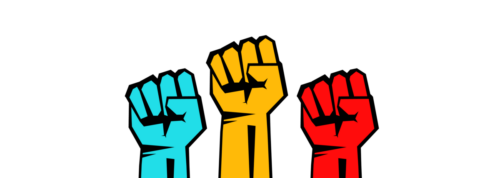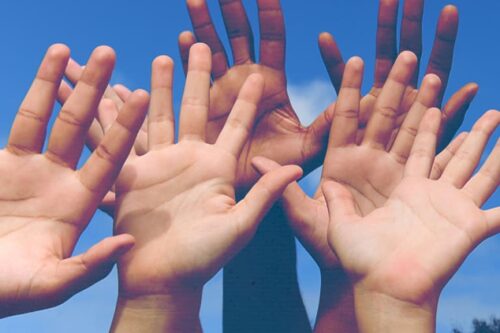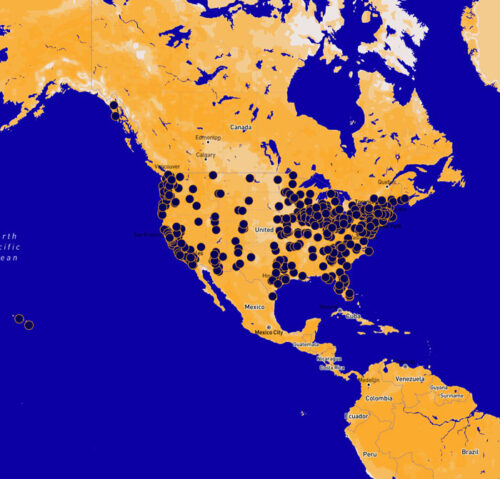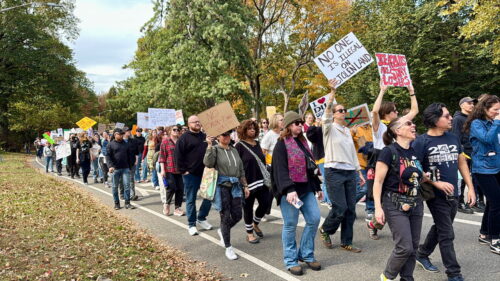
Inclusion: Our Struggles Are Indivisible
Why is inclusion so important?
Donald Trump’s victory in November 2016 was shocking to many of us, but it did not come out of nowhere. It could only have happened in a society that has consistently devalued the lives and dignity of historically marginalized groups, such as people of color, immigrants, queer people, religious minorities and women. This means that resistance cannot consist just of fighting back against the extremist agenda. Rather we have to work to overturn the patterns of injustice that are helping extremists rise to power.
Therefore, a core Indivisible principle is that we must model the value of inclusion in our work and challenge efforts to silence the voices of people who have been marginalized or excluded. As we acknowledge the injustices that have brought us to this point we are committed to building groups and partnerships that are diverse, equitable, and inclusive. This is an investment in the durability and solidarity of our communities and in the efficacy of our work. And it is a rejection of the idea that any of us deserves to remain vulnerable or to be left out of the conversation.
This is a particularly important principle for those of us within the Indivisible family who have more social or economic advantages due to our race, class, or gender, for instance, because—whatever our personal beliefs and convictions—we are the ones who have benefited from historic systems of oppression. At the same time, inclusion is not a favor that those of us with more power or standing offer to those of us with less. It is a partnership between everyone to overturn the patterns of injustice that affect us all to varying degrees, either directly or indirectly. After all, if we are one nation, indivisible, then our lives and our struggles are indivisible as well.
In short, inclusion is an affirmation of the principle, articulated by Aboriginal activists from Queensland, that my liberation is bound up in yours.
What does inclusion look like?
Minimally, inclusion is inviting and ensuring access, a safe and welcoming environment, partnership opportunities, and leadership for people of all backgrounds, communities, and identities. This might relate to a person’s race, ethnicity, nationality, religious identity, immigration status, sex, gender identity, sexual orientation, age, ability, health (including mental health), socioeconomic status—and/or how these and other facets of identity interact.
Centering the leadership of marginalized communities
It’s common for people to claim that they’re speaking for the voiceless. But in the words of Arundhati Roy, “There’s really no such thing as the ‘voiceless’. There are only the deliberately silenced, or the preferably unheard.” The job of an advocate is not to speak for a marginalized group. It’s to ensure that when marginalized groups and leaders are speaking, everyone is listening, and that their messages are understood and amplified. The voices, experiences, and leadership of those most affected by the extremist agenda, and systems of oppression more broadly, must be central to our work.
Thus, inclusion can mean different things in practice. It can mean being mindful of the power dynamics that operate during meetings or events. It means making your own group as diverse as your community, while promoting diversity in leadership. It also means reaching out to existing community groups that have been working on racial justice, immigrant rights, poverty, women’s rights, environmental justice, disability rights, and LGBTQIA+ rights, understanding their priorities and how you can support them, and inviting them to join you in developing and participating in your congressional advocacy efforts (forming partnerships and other concrete steps will be discussed in greater detail below).
Inclusion makes us stronger
Inclusion can be a source of strength, flexibility and endurance. Simply put, we sharpen our analysis by adding more perspectives. We increase our efficacy by drawing upon more networks, organizations, and resources. Recognizing the variety of experiences beyond our own humbles us and allows us to be nimble and responsive in moments of crisis. Inclusion also offers a reminder to each other that none of us is in this alone.
Inclusion requires leadership, humility, patience, love and courage, which we know are abundant among our Indivisible family. It also requires an intentional effort. Many Indivisible groups may not reflect the demographics of their local communities. Creating a movement that is inclusive across its outreach, membership, leadership, partnerships, group dynamics, analysis, and actions will take a lot of work. We are fighting not just to defeat the extremist agenda but also the systemic injustice and hateful ideas that propelled those on the extreme right to power in the first place. Together, we have the chance to ensure that in building a multi-racial inclusive movement we also help build the nation that we believe in: an America that finally fulfills its promise of liberty, equity, and justice for all.
How Can We Build and Sustain an Inclusive Movement?
You’d never assume that your group’s events will just organize themselves, and you can’t assume that inclusion will take care of itself either. In activism, inclusion is all too often treated as an afterthought. The truth is that creating environments where everyone is safe, welcome, and respected requires work and thought—just like any other aspect of managing a group.
Remember, if your group lacks diversity, you are not alone. This is not a new issue, and across the country, many progressive groups are grappling with this issue. While some have developed and implemented effective approaches, for many, the national progressive playbook is being written now on how groups composed primarily of folks from a privileged cohort can effectively engage with diverse organizations and promote inclusivity. We offer these strategies and tactics as guideposts, and welcome feedback to build our body of knowledge around this issue. We encourage you to be creative and push the boundaries of what we can do to be a more inclusive and effective movement.
Moreover, our work does not take place in a vacuum, sealed off from the same patterns of exclusion that led to the rise of the extremist agenda. Like the air that surrounds us, we can internalize and take for granted the messages, behaviors, and norms that make up our social atmosphere. This is true for us as individuals as well as groups. White people and other dominant groups need to be constantly aware of our prejudices and privileges, as part of our work for social justice. Without continuous effort and dedication, history has shown that movements for social change will often reproduce the same exclusionary dynamics—like sexism, racism, ableism, transphobia, or islamophobia—that they seek to oppose, despite the best of intentions. Nevertheless, there are concrete steps we can take to build the powerful, effective, and resilient movements that we desire and that a just society demands.
Concrete Steps
Making inclusion a conscious effort—and a priority
This means making a plan and putting time, effort, people, and resources towards it. While it is everyone’s responsibility to foster an inclusive and welcoming environment, depending on your group, you might do one or more of the following:
Create an Inclusion Working Group. This group can provide resources on power, privilege, systems of oppression, and how those systems interact; help organize trainings and readings; and assist your various workstreams. This group should be as diverse as possible, but be sure not to lay it all on members of marginalized groups; inclusion is everyone’s business. It might make sense to have someone from this team review meeting agendas and action plans, with the opportunity to provide feedback in order to help make inclusivity a consistent lens throughout the work of the group. That said, inclusion should be mainstreamed throughout all aspects of your group’s work.
Create an inclusion plan or strategy for the entire local group. Ask existing working groups to reflect on their own work to date and where they could improve on inclusion. Develop a group statement of values on inclusion, and policies to promote it, including an anti-harassment policy.
Identify a person or team within your organization who can take the lead on hearing (confidentially) any concerns that arise regarding inclusion, equity, or discrimination, looking into these concerns, and identifying and resolving problems. Where problems arise, consider reaching out to an outside facilitator with training in developing inclusive spaces.
If you’re becoming a formal organization, prioritize a diverse advisory board comprised of leaders representing long-time community organizations connected to your issues. Reach out to local groups working on relevant issues to offer support and/or partnerships, and to seek guidance on how to move forward together, with accountability. See this guide for suggestions on how to best approach and develop inclusive partnerships.
Consider holding potlucks or other informal gatherings (with food) as a part of your regular meeting plans. These are more relaxed and help to build trust.
Volunteer Mobilization
Making your group welcoming to everyone requires intentional effort and reflection: some people don’t have access to computers, or to transportation, for example. Others need to know in advance if an event will be handicapped accessible. To get started, you can:
- Use a variety of recruitment methods (in multiple languages, if you have translation capacity): online, offline, with flyers, at community meetings, in religious institutions, schools, union halls and worker’s centers, retirement centers, etc.
- Welcome varying levels of participation. Some volunteers might be available only a couple hours a week or month, and might need to participate from home. That doesn’t mean their contributions are any less important; indeed, most movements include a ton of folks like this. Someone at home could manage the group Facebook page, or help with recruitment calls, or any number of actions.
- Provide opportunities to meet or volunteer at various times throughout the day and week.
- Provide multiple entry points for everyone to contribute based on their unique assets and skills.
- Establish partnerships with other local groups. This can provide opportunities to reach new members who reflect the diversity of your community, or who have direct experiences with the issues you are organizing around. This is discussed in detail here.
Meetings and Events
Proactively address any obstacles to participation in your meetings or events.
- Aim your agendas and content to the newest people in the room. Providing quick context at the top of each agenda item is important.
- Designate at least one person (the more the better) as greeters for people. Having someone introduce themselves and proactively welcome everyone sets a good tone for the event.
- Ask new people to introduce themselves to the group, if they are comfortable doing so.
- Try to organize childcare accommodations. This is a great volunteer opportunity for anyone who is able. Make sure to proactively reach out to people of all genders, not only women and other people who are traditionally leaned on as caretakers.
- Pronounce people’s names correctly. Whoever is leading the agenda should ask in advance (privately) to ensure accuracy.
- Central locations, close to public transportation, and with wheelchair accessibility are ideal. In rural areas, where public transportation can be limited, consider arranging carpools.
- Transcribe or record meeting minutes for those who cannot attend in person. If possible, provide a dial-in or video-chat option.
- Some people are juggling very busy lives. Have an agenda that you send out in advance and stick to it to respect people’s time.
- Proactively address language or communication barriers and limit specialized vocabulary. Acronyms can be handy, but appoint an “interpreter” or someone who can be the voice for folks who are brand new to the movement and may be less likely to speak out when they have a question. [Example: “Excuse me, did you say ALEC? What does that mean?]
- Ask everyone to state their pronouns and make sure to explain why this is important. Give examples of how to use different personal pronouns in a sentence.
- Provide gender neutral bathrooms by identifying venues either with gender neutral facilities already or have a facility that can be designated with a sign during your meeting.
- Set some clear guidelines for meetings to make them more inclusive, such as minimizing interruptions (set a norm for your group that one person speaks at a time, commonly called the “one person, one mic” rule), having a facilitator who is calling on folks to speak, and keeping running track of whether people from different backgrounds are being heard from, asking people to be aware of how often they’re speaking, etc. Reflect on whether your facilitation is responsive to the needs of the whole group. You can build the capacity of members to learn and practice facilitation skills by partnering with more experienced facilitators. Provide opportunities for people who tend to be quiet in meetings to participate in small groups, or by sharing in pairs, etc.
Group Power Dynamics
As the poet and author Audre Lorde explained,
“without community there is no liberation, only the most vulnerable and temporary armistice between an individual and her oppression. But community must not mean a shedding of our differences, nor the pathetic pretense that these differences do not exist.”
Power dynamics play out in our organizations and our everyday lives, often without our awareness. This happens when discussions are dominated by people who exclude participation, unique experiences are universalized, or certain issues are prioritized at the expense of others, for example. We can take steps to address such power dynamics by first practicing awareness.
At your meetings or events, observe:
- Who is present? Who is absent? Why are they absent? Does our group reflect the demographic makeup of our state or congressional district?
- Are some perspectives not heard from regularly while others are provided frequently? Are masculine or white opinions held in higher esteem? Taking a moment to take stock of who is in the room is helpful in making sure that folks who are underrepresented get heard from.
- Are there barriers to participation?
- Are some positions held—or types of work done—disproportionately by members of a particular identity group? For example, is the leadership or public face of the organization disproportionately white? Do women and trans people do the majority of the unrecognized and undervalued work: taking notes, cleaning, answering the phones, taking care of others, recognizing and appreciating people’s work?
- Are specific leadership or communication styles assumed to be ideal? Is formal, academic speech valued over storytelling, speaking from experience, or other sources of knowledge?
Acting with Intention: Suggestions on How to Approach the Work
Open the Conversation
The first step is putting this topic on the agenda, if you haven’t discussed it already. It is never too late to start this conversation.
Presume Ignorance and Own the Challenges
In early stages of organizing—especially when we’re moving fast and responding to crises—we often make decisions that set the stage for the future. For example, if your first meeting was held somewhere that doesn’t have public transit access, it might have limited the ability of people who don’t own cars or who have disabilities to attend. Because those people weren’t in the room at the beginning, their perspectives aren’t being taken into consideration in planning the next meeting—and the cycle continues.
This is particularly important because many of us are organized through our existing social networks, and the reality of American life is that most of us have friends who share similar backgrounds and look like us. Given the way that our social position within systems of oppression conditions the range of experiences we are exposed to, ignorance is inevitable unless we’re actively seeking out diversity and other perspectives.
Dynamics that promote group homogeneity usually happen unintentionally—so we have to be intentional about acknowledging them and addressing them. Ask yourself and your teammates, with honesty and respect, and without judgment: Where are we lacking in inclusion and accessibility – in our outreach, membership, partnerships, group dynamics, and/or in our actions? How did that happen? Don’t forget to include conversations with marginalized groups; given their first hand experience with systems of oppression, they can often offer suggestions that more privileged folks may have missed. With a sense of where your group can improve, you can start to think about solutions.
Acknowledge that We May Start from Different Places
It’s important in opening conversations on inclusion to not assume that we all start on the same page. We all bring different perspectives based on our lives, experiences, and identities. Working together means understanding those different perspectives, and that means listening to each other.
Some are utterly shocked by the results of extremists winning elections. Others are sadly unsurprised, because when extremists win elections it is seen as an outgrowth of patterns of marginalization that are as old as our history as a country.
Some of us are horrified by the extremist agenda because it violates our values and what we believe in. Some of us are facing direct and immediate fears for our personal safety, financial security, and lives here in America.
Some of us are new to activism, while others have been building and leading movements for decades. And some of us may bring from past experiences distrust and serious concerns about the potential for movements to be truly equitable.
These differences affect the attitudes we bring to activism going forward, and it’s important to acknowledge them if we’re going to build communities where we have the trust to confide in and rely upon each other.
The purpose of this conversation is to listen, acknowledge, respect, and understand the unique perspectives that are present—preparing the ground for the collective actions that build trust and authentic relationships.
Recognize that Everyone Sets Their Own Pace and Boundaries
While it’s important to look for diverse perspectives, it’s also very important to not expect women, people of color, LGBTQIA+ people, or others to do the work of making a group more inclusive or educating everyone about our own experiences.
Remember too that not everyone is always ready to talk about these questions. Those directly affected by the extremist agenda are feeling especially hurt, scared, angry, or exhausted. It’s important to accept their needs for space in deciding how to participate in conversations around inclusion.
Don’t Dismiss Other People’s Perspectives or Experiences
We’ve heard some anecdotes about people’s concerns being dismissed as “identity politics.” This ignores the fact that we all have identities, whether we recognize them or not. Our experiences and social positions shape how we see the world and what issues resonate with us most personally. This is as true for a white man as it is for a black woman; as true for a cis woman as it is for a trans* woman; as true for a Christian as it is for a Muslim. That’s why it’s so frustrating to see some issues (like police violence) dismissed as “identity politics” while others (like tax cuts) are treated as relevant to everyone. Dismissing someone’s concern about an issue that affects them directly as “identity politics” devalues their contribution and ignores the fact that these issues are fundamentally about what kind of nation we are and whether we truly have equity and justice for all.
Commit to Learning, Growing, and Adapting as An Ongoing Process
Solidarity is not something we achieve in a single moment—it’s an ongoing and dynamic engagement, which will sometimes push us out of our comfort zone. Some days will test us more than others, but the obstacles to unity can be largely overcome. In the face of challenges, we must be self-reflective, determined, creative, and flexible.
When marginalized people take the time to point out shortcomings, that is an act of generosity. We can respond to feedback in the spirit of growth and learning by thanking the person offering feedback for their honesty and vulnerability and doing our best to incorporate the knowledge they have offered into our work. The reward of challenging ourselves and each other is that we strengthen the authenticity and intimacy of our connections within this movement.
Recognize and Embrace that This Is Complicated
Humans are complicated and unique; we each interact and view the world in ways that are distinct. Have you ever had a conversation with a friend that was uncomfortable and emotionally vulnerable, but resulted in a closer and more authentic relationship? Learning from one another is not always comfortable and easy, and does not always go according to plan. Speaking to the limits of your own personal experience and knowledge can feel vulnerable but it opens the door for others to be open with you. Being humble, open, and caring—and willing to admit mistakes and learn from them—will take you far.
Action Is Important
Inclusivity and power dynamics touch on all we do. They arise every time we choose a particular issue to work on, how we recruit, how we run meetings, etc. So being inclusive and equitable should inform all of our conversations. But talking about inclusivity is just the first step; acting on these conversations, even if it means failing and trying again, is just as important.
Related Resources


Diversity, Equity, and Inclusion Resources
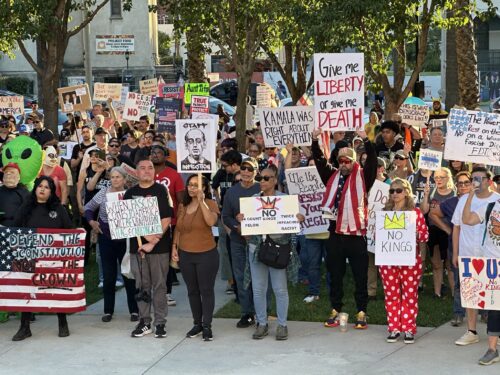
Diversity, Equity, and Inclusion Definitions
